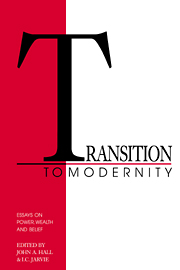Book contents
- Frontmatter
- Contents
- List of illustrations
- List of contributors
- Introduction
- PART I THE PRE-MODERN WORLD
- PART II TRANSITIONS TO THE MODERN WORLD
- PART III MODERNITY AND ITS DISCONTENTS
- 8 Science, politics, enchantment
- 9 Deconstructing post-modernism: Gellner and Crocodile Dundee
- 10 A methodology without presuppositions?
- 11 Gellner's positivism
- 12 Left versus Right in French political ideology
- 13 Property, justice and common good after socialism
- 14 Social contract, democracy and freedom
- 15 Thoughts on liberalisation
- 16 Peace, peace at last?
- Indexes
11 - Gellner's positivism
Published online by Cambridge University Press: 02 February 2010
- Frontmatter
- Contents
- List of illustrations
- List of contributors
- Introduction
- PART I THE PRE-MODERN WORLD
- PART II TRANSITIONS TO THE MODERN WORLD
- PART III MODERNITY AND ITS DISCONTENTS
- 8 Science, politics, enchantment
- 9 Deconstructing post-modernism: Gellner and Crocodile Dundee
- 10 A methodology without presuppositions?
- 11 Gellner's positivism
- 12 Left versus Right in French political ideology
- 13 Property, justice and common good after socialism
- 14 Social contract, democracy and freedom
- 15 Thoughts on liberalisation
- 16 Peace, peace at last?
- Indexes
Summary
A colleague of mine who was both a product of Oxford and an ‘Oxford philosopher’, once described Gellner to me as a sociologist. This colleague affected some disbelief when I offered the information that Gellner had, as a Balliol undergraduate studying PPE, won the John Locke Prize in philosophy. Some years later, my correction notwithstanding, that colleague was still wont to characterise Gellner as a sociologist. I took it that this resistance was social: the Oxford commonroom circuit, as it were, had decisively characterised this most dangerous critic as ‘not really a philosopher, a sociologist’. They had evidence. Four fifths of Gellner's critique of Oxford philosophy, Words and Things, was an entirely orthodox marshalling of arguments to show the incoherencies and inconsistencies of that school of thought. It displayed a detailed familiarity with the professional writings of all of the most influential of the British language philosophers of the time. The last chapter of the book, however, broke new ground. After demolishing the Oxford philosophy movement on its own terms, a sociology of it was advanced. Gellner's claim was that the content of the doctrine and its successful entrenchment in Oxbridge could best be explained by examining the social institutions which gave it nurture, and the social mechanisms which perpetuated it. One convenient way for those in the movement to erase the memory of Gellner's searing philosophical critique was to remember only his sociological analysis, which they endeavoured to neutralise by declaring it unfairly ad hominem. This warranted dismissing it with the equally ad hominem argument that its author was not really a professional philosopher, rather a sociologist unable to appreciate philosophical matters.
- Type
- Chapter
- Information
- Transition to ModernityEssays on Power, Wealth and Belief, pp. 243 - 258Publisher: Cambridge University PressPrint publication year: 1992

